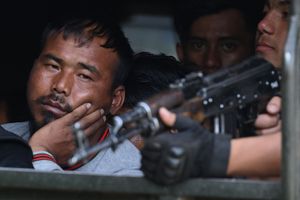The Kukis claim to be like the biblical sparrows in the sky—they sow not, neither do they reap, nor gather into barns.
As much was told by a Kuki to T.C. Hodson, assistant political agent in Manipur in the late 19th century and later the first William Wyse professor of social anthropology at Cambridge. His Thado Grammar, The Meitheis and The Naga Tribes of Manipur are still considered among the most authoritative monographs on the culture, customs, languages, dialects, rituals, history, folk tales and feuds of the tribes of India’s northeast. “We are like the birds of the air,” the genial Kuki told Hodson. “We make our nest here this year, and who knows where we shall build next year.”
It is exactly this Kuki habit that is now vexing the Meiteis, Manipur’s majority who inhabit the narrow Imphal valley of glimmering lakes and vanishing shirui lilies. They see the Kukis and the several Naga tribes, who have been inhabiting the hills that surround their valley, grabbing government jobs under the Scheduled Tribe quota and making nests in their pristine valley. At the same time, neither the Meiteis nor anyone else is allowed to nest on the hills, since the hills are reserved for the tribes. With the result, the narrow valley, which the Meiteis thought was their preserve, is getting crowded, whereas the hills, the tribes’ reserve, are remaining sparsely peopled, but sprouting poppy plants.
Well, not exactly sparsely peopled. The Meitei-strong Biren Singh government says, the Kukis are grabbing more and more of the forest space too. A Kuki village, by custom, belongs to its chief; so when a chief’s sons grow up, they split and set up their own villages and grow more poppy.
While most insurgencies in the northeast are simple tribal autonomy issues pitted against India’s mainstream republicanism, Manipur’s issues have too many substream currents. One, most of the tribesmen are Christian by faith since the late 19th century, and the Meiteis have been Vaishnavite Hindus since at least the early 18th century. Two, the Meiteis, who are also Manipur’s political elite, looked at the Kukis earlier as interlopers from Myanmar, and now as insurgents. Three, there is indeed widespread poppy farming in the Kuki-inhabited hills, mostly illicit.
The current troubles cropped up after Biren got his second term last year. The Meiteis have been seeking ST status for themselves too; Biren has been inclined to grant it; and the High Court now told the government to fast-track it. The Kukis now fear that the better-schooled Meities would crowd them out of their quota seats and jobs.
Pouring oil into the fire have been the recent moves by the Biren regime. Declaring the forests, till now the tribes’ preserve, as the government’s reserves, it is evicting several ‘illegal’ habitats. Added to it is a move to slash and burn most of the poppy crop, throwing the tribes into penury.
Further provoking the Kukis has been Biren’s decision to pull out of a tripartite ceasefire-and-talks deal with militant Kuki outfits. Luckily, the Centre forbade him from pulling out, but the damage had been done—the tribes lost the trust they had in Biren since the 2017 polls when the armed groups were lured into talks on promises of possible Bodo-like autonomy. This had made them dump the long-reigning Congress and vote the BJP.
All this boiled over on May 3. The Kukis took out a protest march against ST status to the Meiteis. The Meiteis say the march turned violent; the Kukis say their war memorial and churches were burnt.
The truth is: 60 humans lost their lives.
prasannan@theweek.in


